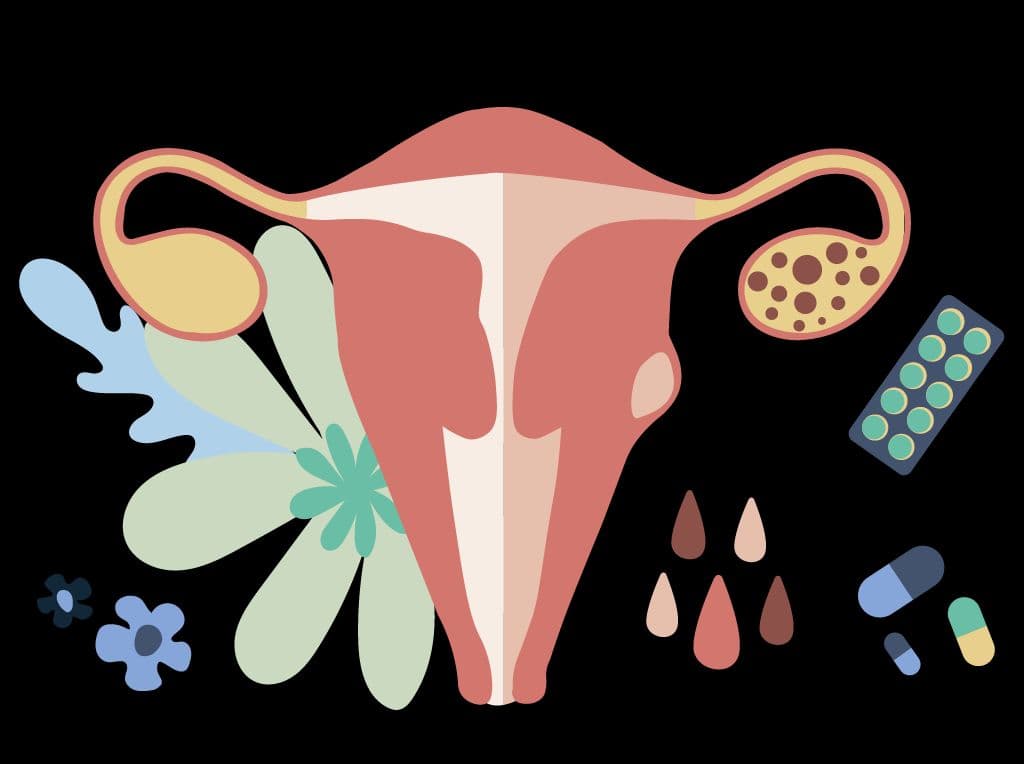Polycystic Ovary Syndrome (PCOS) is an inflammatory condition in the ovaries that adversely affects the female reproductive system – mainly menstruation. Especially in women of reproductive age, PCOS may create a range of health complications further leading to infertility.
Some of the very common symptoms of PCOS are hair loss, obesity, ovarian cysts, fatigue, constant mood swings, facial hair growth and major changes in the menstrual cycle. PCOS is easily associated with irregular periods – that are caused due to the hormonal imbalance.
However, periods in PCOS are a different experience to every person. For some women, their periods are running like clockwork, while some face delays by a day or two, and some women do not get their periods for months.
Let’s take a look at why it is so and how we can deal with it better?
Why do periods get irregular in PCOS?
In the menstrual cycle, the ovaries release a follicle that is matured and ready to be fertilised. However, due to the high levels of androgens like testosterone and luteinizing hormone – caused due to the hormonal imbalance in PCOS, the release of this follicle is stalled. And then this follicle stays within the ovaries, preventing ovulation. And these hormonal events further stop the uterus from shedding its lining – meaning no periods.
When should you be concerned?
On an average, the monthly menstrual cycle is 28 days, however it can differ from person to person. A cycle ranging between 21 to 35 days is considered to be normal. But if your periods are delayed for over a month or more, it is a concern that needs to be diagnosed and addressed.
Amenorrhea: Having cycles that last for longer than 35 days, or having eight or less cycles in a year can be defined as irregular periods. Experiencing no periods at all for 3 to 4 months consecutively is known as amenorrhea, and is known to be one of the most severe causes for infertility. You must immediately seek your Gynaecologist’s consultation in this case.
Menorrhagia: While some PCOS patients have irregular periods, some experience extremely heavy bleeding during their cycle. In this condition, the bleeding lasts for more than 7 days and so do the cramps. While society has made us believe that “heavy periods” is a common condition, we must accept that it is not. It is completely abnormal and also a sign of many underlying ailments such as cysts, fibroids, etc. that require immediate medical attention.
Dysmenorrhea: Heavy bleeding is usually followed by some more complications such as painful cramps. Cramps that are worse than the usual period pain. However, extremely painful periods can be associated with both PCOS and endometriosis. So, if you are experiencing an unusual pain during or before your periods, bring it to your gynaecologist’s notice.

How to improve irregular periods?
While getting regular periods is a natural body functioning, PCOS leaves you no option but to opt for external ways to balance out the hormonal events and get regular periods. While there are many medical treatments that help you in dealing with PCOS, you can also attempt at making some major lifestyle changes and along with some medications, that can aid in regularisation of your periods.
Since each body and PCOS condition is unique – there is no “one size fits all” kind of a solution. You will have to self-examine what works for your body and what helps you the most.
The following guidelines can be a good kick-start for you to get your periods back on track:
Improvising your diet
Eating healthy in today’s times is a difficult task, but not impossible. While it is okay to give in into your cravings at times, having and following a strict diet otherwise is a necessity. If you aren’t eating the right nutrients in the right proportions, your hypothalamus, pituitary and adrenal glands may get affected. And these glands contribute to the proper functioning and maintenance of your hormonal balance – which is directly linked with your periods.
- Avoid high-fibre diets, as these can lower the levels of progesterone, estrogen, LH and affect your ovulation.
- Consume a high-carb diet, as low-carb diet can disrupt the thyroid functioning. So, consume at least 225-325 grams of carbs out of a 2000 calorie diet on a daily basis.
- Include healthy fats from common sources like vegetable oils, walnuts, flax seeds, fishes, etc.
- Eat Papaya regularly, as it consists of a nutrient called ‘Carotene’ that helps in increasing estrogen levels.
Maintaining the right body weight
Obesity can be both, cause and result of PCOS. Hence, sweating it out and keeping your weight in control should be a priority for those diagnosed with PCOS. Time and again, exercising has proven to be a crucial factor for a healthy body and lifestyle. While it has many benefits for the human body, regular exercising is extremely helpful for those suffering with PCOS, as it decreases the hormonal imbalances and other PCOS symptoms.
Working out for at least 5 days a week for 30 minutes, will help you release a lot of toxins from your body and keep your weight in control. You can try a combination of the following:
- Brisk walking
- Outdoor sports like cycling, swimming, badminton
- Intense Yoga
- Aerobics or Zumba
- Running
You may choose whichever form of exercise, just make sure you will enjoy it and by the end of the session there is a lot of sweat!
Practicing meditation & sound sleep
Stress is a huge trigger in PCOS, as it is directly linked with hormonal imbalances in our body. Higher the stress levels, higher the cortisol levels. Hence, to keep the stress at bay, you can practice meditation.
Regular meditation will relax your body and mind and also induce good sleep – which is another important factor in PCOS. A healthy sleeping schedule ensures a proper body repair and internal functioning. And how do you do it?
- Begin and end your day with some mindful breathing exercises
- Fix a sleeping and waking up schedule
- Eat at least 2 hours before sleeping
- Avoid naps and untimely sleeping
- Keep a check on your stress levels
Medication such as Metformin and birth control pills
In most of the PCOS and irregular period treatments, birth control pills have been very useful. These pills help in releasing of the follicle and aid ovulation by regulating the hormonal levels and lowering the testosterone production in the body.
Metformin is another common and useful medicine in PCOS treatment. However, neither of these methods shouldn’t be opted for without consulting your doctor.
In Addition:
Some home remedies/medication that can lead to improvement in your irregular periods
Dietary supplements
Apart from maintaining a healthy diet, consuming additional supplements can also help in promoting menstrual regularity. These can directly fill up for the nutritional deficiencies in the body and also control the hormonal imbalances. Dietary supplements like iron, folate, calcium and essential vitamins can prove to be useful.
However, you must consult your healthcare provider, before consuming any of these. As these are easily available without prescription, they aren’t guaranteed by any medical authority. Especially, women who are planning for a child or are already pregnant should stay aware of this.
Inositol is present naturally in your body and is similar to vitamin B. It is closely involved with insulin hormone functioning in your body and is also present in a variety of foods. It is very effective for ovary functions and FSH – that aid in regularising periods. The inositol supplement is also commonly used in fertility treatments, owing to its function of increasing ovulation and pregnancy chances.
Cinnamon Water
Cinnamon helps in regulating the insulin levels in the body, which are usually high in case of PCOS. Consuming 5-8 grams of cinnamon powder daily, can increase the chances of getting your periods on time.
There are also cinnamon supplements available in stores that you can consume after consulting your healthcare provider.
Turmeric
Curcumin is an ingredient present in the turmeric root, and it has many health benefits that are known to reduce inflammation and improve mood. It also can affect and improve estrogen hormone levels.
Consumption of turmeric can be useful in regularising periods and also during painful menstruation.
Ginger Tea
Ginger is an anti-inflammatory ingredient that can help in standardising your monthly cycle. Consuming ginger tea with lemon and honey promotes metabolism and is very beneficial for your hormonal health.
Read More: Causes of menstrual irregularities beyond PCOS
Conclusion
Every woman is unique and so are their PCOS experiences. While all the above remedies have proven to be effective in many cases, we’d recommend to you to follow a proper diagnosis as well as treatment from your healthcare provider. It is always best to know what can work for you and what can help you simplify your problem easily. So do not hesitate to reach out to your doctor and prepare the right plan for you.
Disclaimer: This information is educational and should not be construed as medical advice. Please consult your doctor before making any dietary changes or adding supplements.
Proactive For Her is a digital clinic for women, offering accessible, personalised, and confidential healthcare solutions. We offer out-patient care, diagnostic services and programs for various health concerns of Indian women, across their lifetime - from puberty to pregnancy to menopause.

